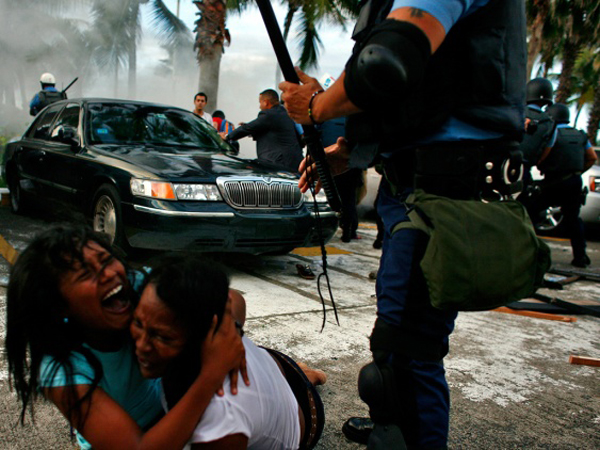
Betty Peña Peña and her daughter Elisa Ramos Peña
Betty Peña Peña brought her 17-year-old daughter Elisa Ramos Peña to a June 30, 2010 protest at the Capitol Building as a lesson in democracy. While peacefully protesting, a low-flying helicopter approached and doused them with tear gas. Betty, who has a respiratory condition, could not breathe and looked for a place not choked with tear gas, but was blocked by the line of Riot Squad officers.
A wall of Riot Squad officers began to attack the protesters with batons and pepper spray. The officers beat the mother and daughter with long batons. They fell under a vehicle, and police continued to beat them even while they were lying on the ground.
Betty threw herself on top of Elisa in an attempt to protect her from the Riot Squad's blows, and police continued to strike the mother and daughter with batons. As Betty tried to shield her daughter with her own body, police pepper-sprayed Betty in the face at close range, causing her to lose consciousness. Elisa, then a high school student, told the ACLU, "I thought I was going to die. At that moment, I thought ... that [my mom] was already dead, and all I could think of was getting out of there to go and get my mom."Betty and Elisa were badly affected by the tear gas and pepper spray. Elisa suffered a hematoma on the right side of her head, and Betty suffered a contusion from one of the blows. Betty was unable to speak for a week because of the chemical agents police used on her, and experienced difficulty speaking for a full year afterwards.
Betty told the ACLU, "Living in the United States with the right to free expression, I never thought this would happen when we try to protest. The Capitol Building is the house of the people. It is an open house, and to close it is a blow to democracy."
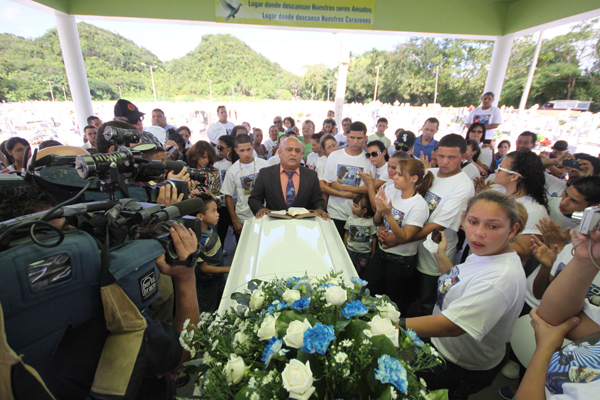
Luis Alberto ("Beto") Santos Figueroa
14-year old Luis Alberto Santos Figueroa was fatally shot in the back of the head by Drug Division officers about two blocks from his home. According to the Puerto Rico Police Department's account of the incident, approximately seven police agents were conducting an operation at a suspected drug point when the boy began to run away and pointed a gun at them. Agent Iván Robles Varela shot the ninth-grade student in the back of the head. Police reported that they recovered a firearm and drugs on or near Santos Figueroa's body. The boy's family disputed the agents' account of the incident, alleging that officer Robles Varela emerged from an unmarked car dressed in civilian clothing and carrying a gun, and shot the boy while he ran away in fear as neighbors shouted at the agent not to shoot. They also maintain that the boy did not possess a firearm and was not involved with drugs. Santos Figueroa was pronounced brain dead before dying of his injuries. Following the opening of an investigation by the Criminal Investigation Corps of the PRPD, the Special Investigations Bureau of the Puerto Rico Department of Justice assumed jurisdiction over the investigation into the incident.
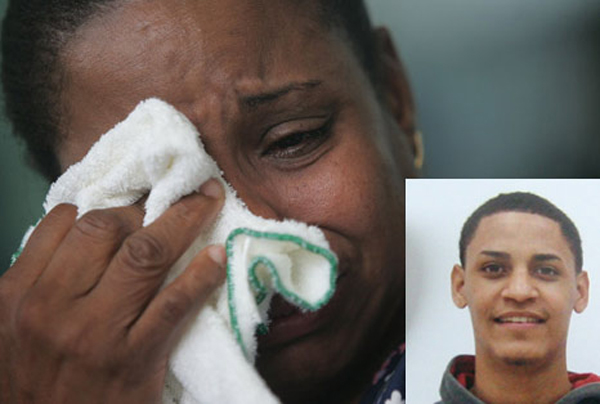
José Alberto Vega Jorge
In September 2010, Puerto Rico Police Department officer Abimalet Natal Rosado shot unarmed, 22-year-old José Alberto Vega Jorge in the back of his head. As the witness to a robbery at a Burger King in Altamira, José had remained at the scene to provide police with a statement and was not a suspect. After the gun of one of five officers at the scene accidentally discharged, officer Natal Rosado began shooting and fired 10 bullets, one of which fatally struck the young man in the back of his head.
Police at the scene did not call an ambulance to provide emergency medical services. Vega Jorge was brought to a hospital over an hour after the shooting; ambulance response time in the area would have been under 10 minutes. Natal Rosado, a rookie officer who reportedly had been on active duty for only a month following 8-10 months of training in the police academy, was subsequently charged with second-degree murder.
The tragic shooting of José caused the PRPD to evaluate the trigger weights of their weapons, which lacked any standard trigger weight and instead were left at their factory settings of 5.5 and 6.5 pounds, which are substantially lighter than the standard trigger weights of U.S. metropolitan police departments such as the NYPD, which requires a trigger weight of 12 pounds on all service weapons. In the mid-1990s the NYPD increased the mandatory trigger weight for service weapons from 8 pounds to 12 pounds in order to minimize unintentional shootings.
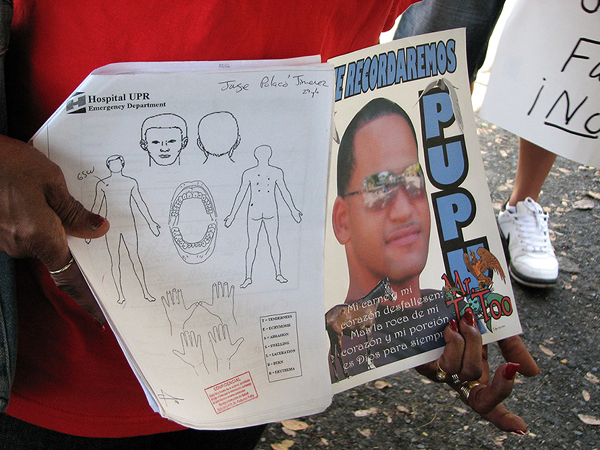
Jorge Luis Polaco Jiménez
PRPD officers shot the unarmed 28-year-old Jorge Luis Polaco Jiménez eight times, seven in the back while he was in police custody. After Jorge smashed his car into a building, police officers reportedly shot him once in his front left shoulder and took him into custody. He was taken away by PRPD officers, ostensibly to get immediate medical assistance at a hospital located 10 minutes away. He arrived at the hospital dead-on-arrival one-and-a-half hours later, with seven bullet wounds to the back in addition to the single gunshot wound to his front shoulder.
Police later claimed they acted in self-defense, but a private investigator hired by Jorge's mother found that he was unarmed and only had a dollar and his house keys in his pocket. The investigation into his killing was closed without interviewing witnesses or examining forensic evidence, and the responsible police officers were never brought to justice.
Jorge's mother Ruth Jiménez de Jesús told the ACLU, "My wish is that the guilty pay, that those responsible pay their due, that they end up in jail. If I killed someone, I would be in jail." She added, "If my son broke the law he belongs in a jail cell, not a cemetery."

Luisa Acevedo Zambrano and José Rodríguez Báez
Union leaders Luisa Acevedo Zambrano and José Rodríguez Báez faced police abuse at multiple peaceful protests, including at a May 20, 2010 protest by about 200 University of Puerto Rico students and labor union leaders and members at the Sheraton Hotel to protest a political fundraising event at which Governor Fortuño was a guest. Without warning, the Riot Squad interrupted the peaceful protest and began indiscriminately beating, kicking and pepper-spraying students, labor union leaders and members, and other protesters.
When Luisa tried to ask the officers what was happening and why they were being attacked, Riot Squad officers sprayed pepper spray directly into her eyes and face and struck her with a baton on the neck. The blow caused Acevedo to fall on the street, smacking her skull on the ground. While she was on the ground a PRPD officer kicked her in the shoulder. Other labor union leaders and members tried to rush to her aid, to prevent police from trampling and pepper-spraying her as she lay helplessly on the ground. One year later, she required an MRI and a CT scan of her neck and cervical vertebrae because she had ongoing problems caused by the baton blows. José was pepper-sprayed and injured so badly that he required emergency medical treatment at a hospital.
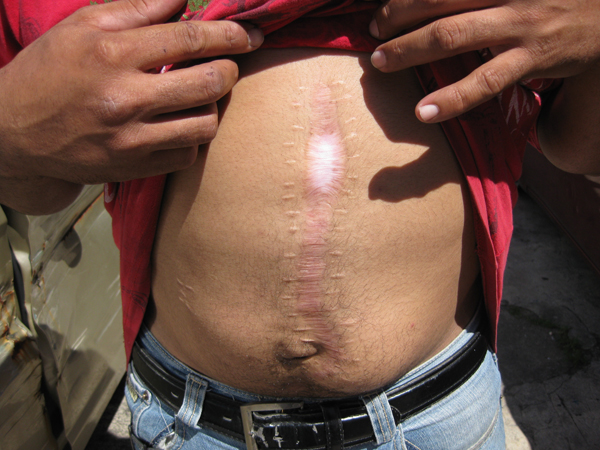
Joel Félix
Dominican immigrant Joel Félix was walking home alone on a Saturday just after midnight when six to eight PRPD officers exited their patrol car and told him to put his arms around his back, handcuffing him without any reason. Félix says that the officers surely knew that he is a Dominican immigrant, as he has an identifiable Dominican accent. They savagely beat and kicked him, causing him to fall to the ground and lose consciousness.
Félix woke up in a hospital bed, flat on his back and in extreme pain. The police officers had apparently abandoned him on the side of the road, and had used his cell phone to call his sister and tell her that he was lying on the ground. An hour later when she finally found him, he did not want to seek treatment at the hospital because he was terrified that the officers would come looking for him.
Eventually, because of his severe pain, he agreed to return to the hospital, where he underwent emergency surgery because of internal bleeding and organ damage caused by the police beating. The doctor told him that he would die without surgery, and would have died if he had delayed seeking medical assistance any longer. Félix was hospitalized for a full month, and had to pay for all of his medical expenses.
Félix filed a complaint with the PRPD, but was so terrified of police retribution that he dropped it after PRPD officers stopped by his home. Félix wanted to file a civil lawsuit against the PRPD for monetary damages, but he says that he was unable to afford to pay a lawyer for the legal fees to initiate a case.
Félix told the ACLU, "Now, when I see a group of police I feel nervous and leave the area. When one police officer comes while you're alone on a corner and he hears that you're a Dominican, they use brutal force, thinking that we can't do anything against them. When they're in a group, that's when they are even more abusive."
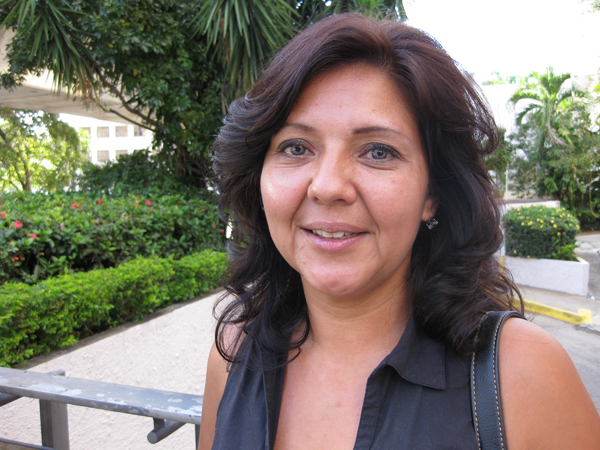
Laura Mota
Laura Mota, a resident of a squatter community comprised mostly of indigent families of Dominican origin, was violently attacked by Riot Squad officers during an August 2009 attempted eviction of her community. Officers doused her face with pepper spray, pulled her by her hair, threw her over a cement barrier, and punched, dragged and kicked her. Laura says that she had merely shouted at police that they should leave and denounced them for the violence they were using on other community members.
She also witnessed police drag, kick, punch, and pepper-spray her eight-months-pregnant friend Maritza de la Cruz, rendering her unconscious, and she saw police pepper-spray and beat Maritza's five-year-old son with nightsticks. Mota also witnessed police kick a man in the back and Taser him eight times while he screamed, "They're going to kill me!" Mota says, "That screaming still haunts me to this day. He had foaming coming out of his mouth and blood all over his face."
Mota says that police used racial and ethnic epithets throughout the attempted eviction operation and during the subsequent police occupation of the community over the next year-and-a-half.
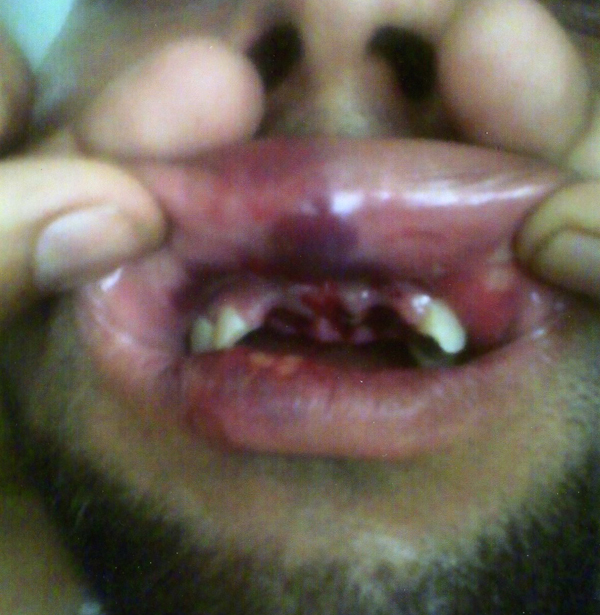
Mauricio Castillo Shaw
On April 29, 2010, PRPD Drug Division officers pounded on the door of Mauricio Alejandro Castillo Shaw's home, and when he opened the door, approximately 20 Drug Division officers entered and informed him they had an order to enter, although they did not show him a warrant at any time. Officers handcuffed him, pushed him against the wall, and threw him on the ground, breaking his two front teeth and his jawbone. The officers then lifted him by his handcuffed wrists and began punching him and striking him with batons while he was still handcuffed. Castillo Shaw told the ACLU, "They lifted my head, and I could feel that my mouth was full, and I realized it was full of blood. Blood was running down my face and pouring out of my mouth."
He was subsequently released without charge or citation, and police did not find any drugs or weapons.
Castillo Shaw filed a complaint with the PRPD that same day, in which he verbally provided detailed information about the incident and provided photos taken of his substantial injuries while he was in the hospital. But, as he explained to the ACLU, "The complaint didn't include anything that I said. It just said 'Report of Incident,' but it didn't say how they broke my face. It simply wasn't the version of events that I told them." One week later, on May 7, 2010, PRPD officers entered Castillo Shaw's home and told him he was under arrest. He was retroactively charged with two counts of possessing controlled substances and one count of possessing illegal weapons, based on the operation conducted one week earlier. He told the ACLU, "I think personally that they brought charges against me because I made the complaint." Castillo Shaw has heard nothing about the status of his complaint.
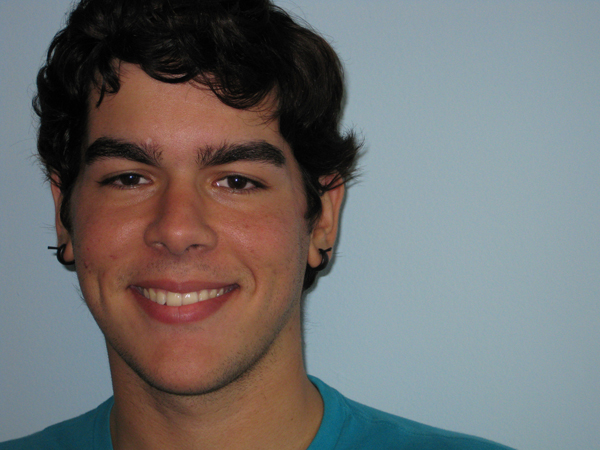
Roberto Morales
When he was a University of Puerto Rico student, Roberto Morales was subjected to police abuse on multiple occasions when he peacefully protested police abuse against students and university policies including a school fee increase. He was among a group of students at a peaceful "paint-in" protest on campus who were violently attacked by police on February 9, 2011. Students gathered to peacefully paint messages. As police arrived and began filming the students, they chanted, "Get out, get out, get out police." The Riot Squad then arrived and heavily sprayed the students with pepper spray, and began to strike the students with nightsticks. Police chased the students around the campus, striking the fleeing students in the back and shoulders with batons and continuing to pepper-spray them. Students ran into the library in an attempt to escape the beatings; Riot Squad officers tried to chase them inside, but library employees assisted the students to hold the doors shut.
Reflecting on the incident, Roberto explained, "We were quietly painting and talking amongst ourselves, but the police were savage that day. They were hitting and pushing people for no reason. It was really bad, really unfair, and totally unjustified. Obviously they don't agree with us, and they have the physical power to stop us. Since it's political, it's personal. The Superintendent of Police, the Chancellor, and the Governor are against what we believe and what we do to express our beliefs."
In another incident in January 2011, Roberto had been handing out flyers on campus with other students when PRPD officers ordered him to leave the school building. Thirty seconds later, as he was walking down the stairs to exit, police violently arrested him and other students. Two officers grabbed him, one grabbing his back and the other grabbing his shirt, violently threw him to the floor face-down, and handcuffed him tightly and painfully with plastic restraining straps.